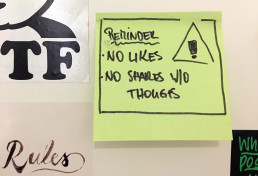What?
iA Inc./Oliver Reichenstein recently shared this article on Twitter by The Atlantic: “Twitter should kill the Retweet”. In which Twitters CEO Jack Dorsey was reflecting about the value, benefit and influence of its Like-Button. There are many aspects to this once you start thinking about it. Aspects way beyond the question what healthy communication looks like. I’d personally welcome getting rid of Likes, playcounts, views altogether.
Why?
The reasons are manifold. What else are they other than easy to manipulate status symbols? I don’t want to dive any deeper into that. But why do we have to wait for Twitter, Facebook etc to take action? Oliver nailed it:
“Will try to emulate that behavior now. No likes, no retweets, all comments.”
– iA Inc./Reichenstein @Twitter
I joined the challenge this Saturday and turned it into a two-weeks experiment: No more likes on social media, no retweets/shares without adding my own thoughts. Confession: I’m a heavy Like-button user. And it’s been interesting so far – an exercise in mindfulness.
I’ve been trying to be more mindful and selective about what I’m writing and sharing on social media before. Yet I didn’t have a concept of how often and in which situations I was simply using a Like to communicate ‘something’. Let’s be honest: a Like is a generic thing. It depends on context, relationship, opinion, personal preferences and whatnot to make sense of its meaning. When hitting Like on a friends’ new piece of music it doesn’t communicate anything but “heard it”. Maybe I mean to say “hey, it’s good – I LIKE IT!”. It needs the receiving person to understand my taste in music and judgement to interpret it.
There are also occasions on which I just like a piece of work without really understanding what it is that strikes my chords. The emotional response is simply faster than the rational. Then I need to step back a moment and reflect that ‘something’. Once uncovered I’m able to convey my appreciation on a much more specific and meaningful level. Isn’t that what social media really should be about?
The initial conversation with Oliver on Twitter felt more meaningful. If it wasn’t for that I’m not so sure if I’ve been inspired to do this challenge. To me it was a bit like “now that we’re polite and shit and can’t run away from the exchange with pressing a heart-shaped button, how do respectfully end a conversation online again?”. It was a bit funny.
First take-aways, new habits–

Ugly, yet effective:
Use sticky note with flat’s door.
Do Likes work as bookmarks? Not sure about you, for me they never really did. Yet I kept liking tons of things. And whenever I needed a piece from the pile, I ended up digging. Likely without finding what I was looking for. Instead I’ve only been feeding the algorithms. A shitty trade, isn’t it?
Since I started the experiment I’ve been more mindful about content again. Is there a chance I’ll be looking for this piece later? > temporary bookmark. Once I looked it up again > bookmark in Pocket.
Furthermore I notice a shift in what I deem like-worthy. Because I replaced the button with a comment I’m writing less, but better ones. More specific ones. I also want to see the connections between the things I’m digging more clearly. Questions such as “What am I liking about this photo, what makes me laugh or feel this way about it?” help a lot. And they become a habit.
It’s an invitation for writing and thinking about language again. There are so many words I’ve kept in Word Vault – an app aimed at reminding you about words you found interesting with the goal of implementing in your writing routine – that I’m barely using. Because I wasn’t writing as much.
Last not least I’m becoming more aware of what I’m sharing with the algorithms driving the internet. Privacy matters.
Apart from that, Likes, Plays and Views have always been an invitation for manipulations. To get an idea, the Guardian just covered a story about a Band that managed to book a tour with bought fans. That nobody attended. Okay, I guess that’s meant to be a joke or concept art. But it gets the point across. Link below.
References/Links
[open in a new tab]
» The Atlantic: “Twitter should kill the Retweet”
» iA Inc./Reichenstein’s kick-off Tweet
» @Reichenstein / @iA.inc
» Word Vault iOS App
» Threatin: band creates fake fanbase for tour attended by no one